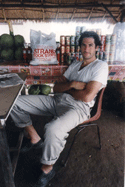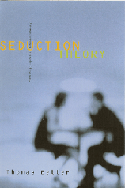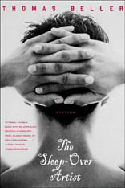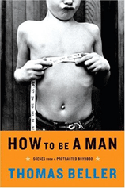
|
Chapter
1 from The Sleep-Over Artist
(For
a synopsis and reviews, click here.)
"Falling
Water"
ALEX FADER GREW UP
IN AN APARTMENT ON THE FOURTEENTH floor of a large prewar building that
took up an entire block of Riverside Drive. From his bedroom window, which
looked north, he could see a broad patch of sky, the tops of buildings,
a multitude of wooden water towers, and off to the left, visible only
if he pressed his cheek to the windowpane, the Hudson River. The view
that most fascinated him, however, was the one to be had by looking directly
down.
Once when he was six, he suddenly rose from his bath, opened the narrow
bathroom window above it, and leaned out. He balanced on his wet stomach,
arms and legs outstretched like Superman, contemplating what it would
be like to take the plunge and if his life so far had contained enough
satisfaction so that it could now reasonably come to a close. He stayed
teetering on the windowsill, looking at the distant pavement below, trying
to imagine what it would feel like to land there and what he would be
thinking during those thrilling seconds of flight.
Half his body felt the moist familiarity of the bathroom, and the other
half, wet and gleaming like a dolphin, hung in the cold air of the unknown.
Then a faint curiosity as to what would happen after his fall—the
ensuing hours and days—asserted itself. He pictured himself in a
steaming heap on the concrete below, and a few minutes later his parents
would be staring confusedly at the bathtub, full of murky water, but empty
of him. He teetered for a while longer. The image of his parents trying
to make sense of the empty bath was amusing at first, but then became
unpleasant. With the same entranced conviction with which he had got up
on the ledge, he got down, closed the window, and resumed his bath.
Having decided that he would not throw his body out the window, he began
throwing smaller, less valuable objects.
First a cracker: it went spinning out the window and out of sight, and
its absence seemed profound. Next were water balloons, whose wobbly downward
trajectory he always monitored until they hit the ground, after which
the small figure of the doorman would appear hustling onto the wet pavement,
looking up. Alex loved the sight of this tiny figure, so formidable in
real life, appearing on the sidewalk, but in watching from above, he was
usually spotted from below.
Things were different at his friend Walker's apartment. Walker lived a
few blocks south of Alex on Riverside Drive, also on the fourteenth floor.
They were ten, and new best friends, and Walker was constantly surprising
him with new and interesting ways to express malice. With regard to throwing
things out the window, it was Walker who introduced the idea of a human
target. They would stand perched at Walker's kitchen window, both holding
on to a pot full of water balanced on the ledge, waiting for a suitable
victim.
The windows of Walker's apartment all looked out over the Hudson River,
and directly below was a broad lonely patch of sidewalk onto which people
arrived like actors walking onto a stage.
They once observed an attractive young woman walking briskly with a bouquet
of flowers in her hands towards a man who was standing with several suitcases
around him, as though waiting for a taxi, right beneath their window.
He was a perfect victim. They were about to douse the man with water,
but it looked like something incredibly romantic was about to occur, some
long-awaited reunion, and Alex and Walker instinctively held back and
watched.
The woman had a strapless top on, and even from the distance of fourteen
floors Alex could make out the subtle jump of her shoulder muscles and
the tremulous softness of her breasts as they bounced up and down with
each step. The flowers had delicate pink petals. The man with the suitcases
stared at her as she approached with bold strides. His body was still
and unmoving. His gaze fixed. He was oblivious to everything else in the
world but her. She walked right up to him and bashed him in the face with
the bouquet, a violent forehand smash. The petals scattered like confetti.
Then, without missing a beat, she turned on her heel and stomped back
in the direction she had come, still clutching the considerably less flowery
bouquet. The man just stood there.
Alex and Walker were so transfixed by this scene that they forgot to pour
water on him.
Other people were
less fortunate. Alex and Walker would stand guard at the kitchen window
until someone appeared on Riverside Drive. There would be time to size
up the target—gait, posture, clothes. At a certain ideal moment
the water would fall forward from their pot in one solid translucent mass,
and then split in half, and then in half again and again, so that what
started as a single glob on the fourteenth floor ended as a thousand pellets
of water on the ground. The pale pavement darkened and the victim became
completely still. This momentary freeze was, for some reason, the most
delicious part.
There was one set of victims who stayed in Alex's mind for a long time
afterwards. A little girl wearing a pink coat, white stockings, and shiny
black shoes ambled down the sunny street, a half step behind her mother.
She looked as if she was on her way either to or from a party. She walked
with unsteady steps, and her mother walked beside her, looking down and
talking, but also giving the girl her independence. They were two small
objects alone on the sidewalk. The water hit the ground in a great hissing
mass and they froze like everyone else.
But in the several
seconds between the pour and the splatter, as Alex watched the water fragment
and descend, a tremendous pang of regret leapt up in his stomach instead
of the more familiar thrill. As he watched the jerky awkward expressiveness
of the little girl walking beneath the water's widening net, he understood
that there was a small corrupting moment about to take place—one
kid introducing another to the random world of fate and bad luck.
|
|







